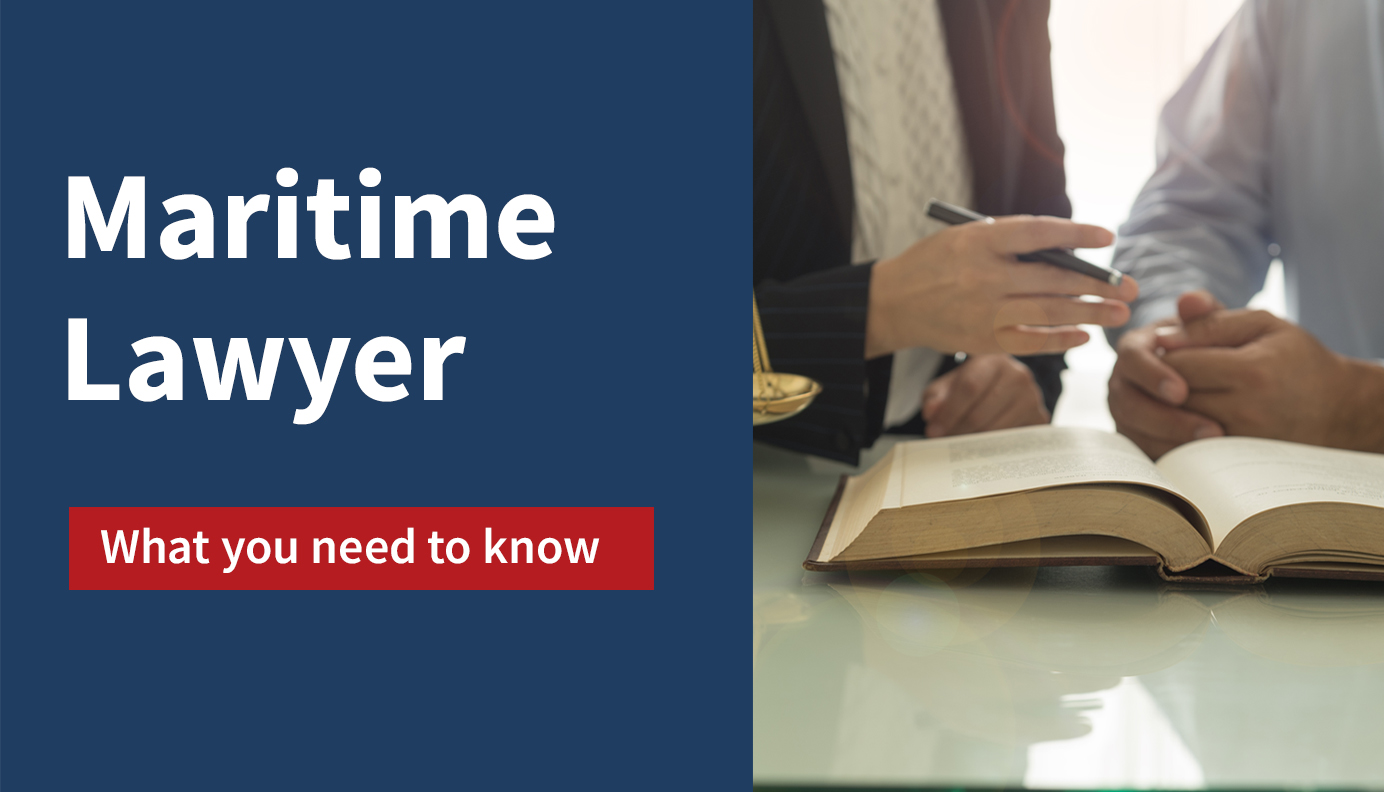In the realm of maritime law, maritime lawyers serve as indispensable guides, navigating the intricate legal waters that govern the world’s oceans. With a deep understanding of admiralty law and a commitment to protecting their clients’ interests, these specialized attorneys play a crucial role in resolving maritime disputes and ensuring the smooth functioning of global trade.
From personal injury claims to cargo damage and vessel collisions, maritime cases present unique legal challenges that require specialized knowledge and expertise. Maritime lawyers possess a comprehensive understanding of the laws and regulations governing maritime activities, enabling them to effectively represent their clients in complex legal proceedings.
Maritime Law Overview: Maritime Lawyer
Maritime law, also known as admiralty law, is a specialized branch of law that governs legal issues arising from maritime activities and transactions. It encompasses a wide range of matters related to navigation, shipping, international trade, and the use and exploration of oceans and waterways.
The historical evolution of maritime law can be traced back to ancient civilizations, with early examples found in the maritime codes of ancient Greece and Rome. Over time, maritime law has developed through a combination of customary practices, treaties, and national legislation.
Sources of Maritime Law
The sources of maritime law are diverse and include:
- Statutes:National and international laws enacted by legislative bodies, such as the United Nations Convention on the Law of the Sea (UNCLOS).
- Treaties:Agreements between nations that establish rules and regulations for maritime activities, such as the International Convention for the Safety of Life at Sea (SOLAS).
- Case Law:Decisions made by courts and tribunals that interpret and apply maritime laws, creating precedents for future cases.
Types of Maritime Cases
Maritime cases encompass a diverse range of legal disputes arising from maritime activities and interactions. These cases can involve a variety of parties, including shipowners, crew members, passengers, cargo owners, and maritime businesses.
The unique legal issues and challenges in maritime cases stem from the complex and often international nature of maritime commerce. Maritime law governs matters such as vessel ownership, navigation, cargo transport, and marine environmental protection, among others.
Common Maritime Cases
- Personal Injury:Injuries sustained by crew members, passengers, or other individuals due to accidents or negligence on board vessels or in maritime facilities.
- Cargo Damage:Loss or damage to cargo during transport, resulting from factors such as improper handling, inadequate packaging, or maritime incidents.
- Vessel Collisions:Accidents involving the collision of two or more vessels, which can lead to injuries, property damage, and environmental harm.
Courts Handling Maritime Cases, Maritime lawyer
Maritime cases can be handled by various courts, depending on the jurisdiction and the nature of the dispute. These courts include:
- Federal Courts:In the United States, federal courts have jurisdiction over maritime cases involving federal laws, such as the Jones Act and the General Maritime Law.
- State Courts:State courts may have jurisdiction over maritime cases that involve state laws, such as personal injury or property damage claims.
- International Tribunals:In cases involving international maritime disputes, international tribunals, such as the International Maritime Organization (IMO), may have jurisdiction.
Role of Maritime Lawyers

Maritime lawyers are legal professionals who specialize in the complex and evolving field of maritime law. They possess a unique combination of knowledge and skills that enable them to navigate the intricacies of maritime regulations, conventions, and case law.Maritime lawyers are responsible for providing legal advice and representation to clients involved in various maritime-related matters.
They may represent ship owners, charterers, cargo interests, insurance companies, and other parties involved in maritime commerce. Their responsibilities include drafting and reviewing contracts, negotiating settlements, and representing clients in litigation before maritime courts and tribunals.
Specialized Knowledge and Skills
Maritime lawyers require a deep understanding of maritime law, including international conventions, domestic statutes, and case law. They must also be familiar with the specialized terminology, customs, and practices of the maritime industry. Additionally, they need strong analytical, research, and writing skills to effectively handle complex legal issues.
Responsibilities and Duties
The responsibilities and duties of maritime lawyers vary depending on the specific area of practice. However, some common tasks include:
- Providing legal advice on maritime-related matters, such as ship finance, ship registration, and marine insurance
- Drafting and reviewing maritime contracts, such as charter parties, bills of lading, and salvage agreements
- Negotiating settlements in maritime disputes, including cargo claims, ship collisions, and personal injuries
- Representing clients in maritime litigation before courts and tribunals, including admiralty courts and arbitration panels
Career Path and Opportunities
Maritime lawyers can work in various settings, including private law firms, in-house legal departments of shipping companies, and government agencies. The career path of a maritime lawyer typically involves gaining experience in maritime law through internships, clerkships, or entry-level positions.
With experience and expertise, maritime lawyers can advance to senior positions, such as partners in law firms or general counsels in shipping companies.
Maritime Law in International Context
Maritime law operates within a complex framework of international laws, conventions, and treaties. Understanding the role of international law is crucial for maritime lawyers navigating the global maritime industry.
Major International Conventions and Treaties
Several key international conventions and treaties govern maritime law, including:
- United Nations Convention on the Law of the Sea (UNCLOS): A comprehensive framework for maritime law, covering issues such as territorial waters, navigation rights, and environmental protection.
- International Convention for the Prevention of Pollution from Ships (MARPOL): Addresses the prevention of pollution from ships, including oil spills and sewage discharge.
- International Convention on Standards of Training, Certification and Watchkeeping for Seafarers (STCW): Sets standards for the training and certification of seafarers.
- Convention on the International Regulations for Preventing Collisions at Sea (COLREGs): Establishes rules for preventing collisions between ships.
Challenges and Opportunities in a Globalized World
The globalization of the maritime industry presents both challenges and opportunities for maritime lawyers. Challenges include:
- Increased complexity of international regulations
- Jurisdictional conflicts between different countries
- Enforcement of international laws across borders
Opportunities include:
- Increased demand for legal services in cross-border maritime transactions
- Opportunities for specialization in specific areas of international maritime law
- Collaboration with international organizations and maritime authorities
Emerging Trends in Maritime Law
Maritime law is constantly evolving to keep pace with new technologies, environmental concerns, and global trade patterns. Some of the most important emerging trends in maritime law include:
– The use of autonomous ships and other unmanned vessels is raising new legal questions about liability, insurance, and safety. – The increasing importance of environmental protection is leading to new regulations and enforcement actions related to pollution, ballast water discharge, and invasive species.
– The growth of global trade is creating new challenges for maritime lawyers, who must be familiar with the laws of multiple jurisdictions.
Technology
The use of technology is one of the most significant emerging trends in maritime law. Autonomous ships and other unmanned vessels are becoming increasingly common, and this is raising new legal questions about liability, insurance, and safety. For example, who is liable if an autonomous ship causes an accident?
Who is responsible for ensuring that autonomous ships are safe?
The use of technology is also changing the way that maritime lawyers practice law. For example, many maritime lawyers now use electronic databases to research legal issues and track the progress of cases. Maritime lawyers are also using technology to communicate with clients and colleagues around the world.
Environmental Concerns
The increasing importance of environmental protection is another major emerging trend in maritime law. This is due in part to the growing awareness of the impact of shipping on the environment. For example, shipping is a major source of air pollution, water pollution, and noise pollution.
In response to these concerns, governments around the world are enacting new regulations to protect the environment. These regulations cover a wide range of issues, including pollution, ballast water discharge, and invasive species. Maritime lawyers must be familiar with these regulations and be able to advise their clients on how to comply with them.
Global Trade
The growth of global trade is also creating new challenges for maritime lawyers. This is because maritime lawyers must be familiar with the laws of multiple jurisdictions. For example, a maritime lawyer who is representing a client in a dispute involving a ship that is registered in one country but is operating in another country must be familiar with the laws of both countries.
The growth of global trade is also leading to new types of maritime disputes. For example, there are now disputes over the use of the Arctic Ocean and the Antarctic Ocean. Maritime lawyers must be prepared to handle these new types of disputes.
Outcome Summary

The practice of maritime law is a dynamic and ever-evolving field, shaped by emerging technologies and environmental concerns. Maritime lawyers are at the forefront of these developments, adapting their strategies to meet the challenges of the 21st century. As the world’s oceans continue to play a vital role in global commerce and transportation, the demand for skilled maritime lawyers will only increase.